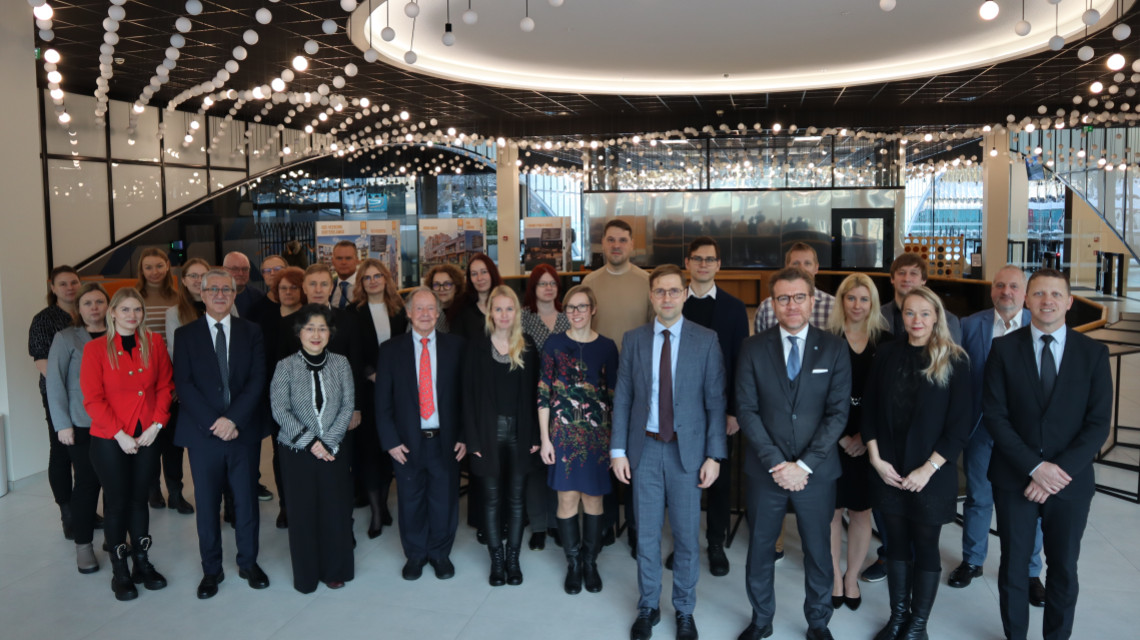The Republic of Estonia is considering embarking on a nuclear power programme focussed on the deployment of small modular reactors (SMR) to meet its climate targets and bolster its energy security. As part of this process, Estonia is developing a new nuclear law and has requested the IAEA's legislative assistance to support the country in strengthening its legal framework.
An IAEA legislative assistance mission organized in cooperation with Estonia's Ministry of Climate from 13 to 17 January 2025 provided an opportunity for in-depth discussions with members of Estonia's Nuclear Energy Programme Implementing Organization and other national stakeholders on the relevant international legal instruments in the areas of nuclear safety, nuclear security, safeguards and civil liability for nuclear damage, as well as elements of a comprehensive nuclear law. Estonia is party to all the main instruments adopted under IAEA auspices in the areas of nuclear safety and security.
The mission included a discussion dedicated to nuclear liability, with a focus on the Convention on Supplementary Compensation for Nuclear Damage (CSC). It highlighted the importance of a global nuclear liability regime and the key features and benefits of the CSC. In the area of nuclear liability, Estonia is currently party to the 1963 Vienna Convention on Civil Liability for Nuclear Damage as well as the Joint Protocol Relating to the Application of the Vienna Convention and the Paris Convention.

The IAEA team highlighted the features and benefits of the Convention on Supplementary Compensation for Nuclear Damage towards establishing a global nuclear liability regime. (Photo: Ministry of Climate)
The IAEA team also met with parliamentarians representing the Nuclear Energy Support Group and the Environmental Committee to raise awareness on elements of nuclear law and on the importance of a robust national legal framework. "The discussion on nuances of nuclear law in comparison to general principles of law was very illuminating," said Mario Kadastik, Member of Parliament and chair of the Nuclear Energy Support Group. "I think it is good to get such insights prior to the actual bill coming to the Parliament as it will improve our understanding of the principles involved."
The rest of the mission was dedicated to a discussion with the legislative working group on the draft nuclear law. The discussion centred on comments that the IAEA provided following a 2024 desktop review of the draft law which assessed it in light of the international legal instruments to which Estonia is party or which it potentially intends to join, as well as relevant Agency standards and guidance.
"The extensive expertise the IAEA is sharing with us during this mission is invaluable in helping to build a legal framework for the use of nuclear energy," said Rene Lauk, a lawyer in Estonia's Ministry of Climate and vice chair of the legislative working group. "Their support and insights significantly contribute to the quality of our drafting process, ensuring the inclusion of best practices and experiences from countries around the world.

To support Estonia in preparing the legal framework for nuclear power, a legislative assistance mission was conducted from 13 to 17 January 2025. (Photo: Ministry of Climate)
Countries considering embarking on a nuclear power programme follow the IAEA Milestones Approach to developing national infrastructure for nuclear power. In October 2023, Estonia hosted an Integrated Nuclear Infrastructure Review mission to review the status of nuclear infrastructure development as outlined in Phase 1 of the IAEA Milestones Approach. The legal framework is one of 19 specific infrastructure issues that need to be addressed during the three progressive phases of infrastructure development.
In June 2024, the Estonian parliament passed a resolution supporting the adoption of nuclear energy, paving the way for the creation of the necessary legal and regulatory framework. The parliament based its decision on analysis conducted by the Nuclear Energy Working Group, which concluded that the adoption of nuclear energy in Estonia was feasible.
The event was implemented under the IAEA Legislative Assistance Programme within the framework of an interregional technical cooperation project.






